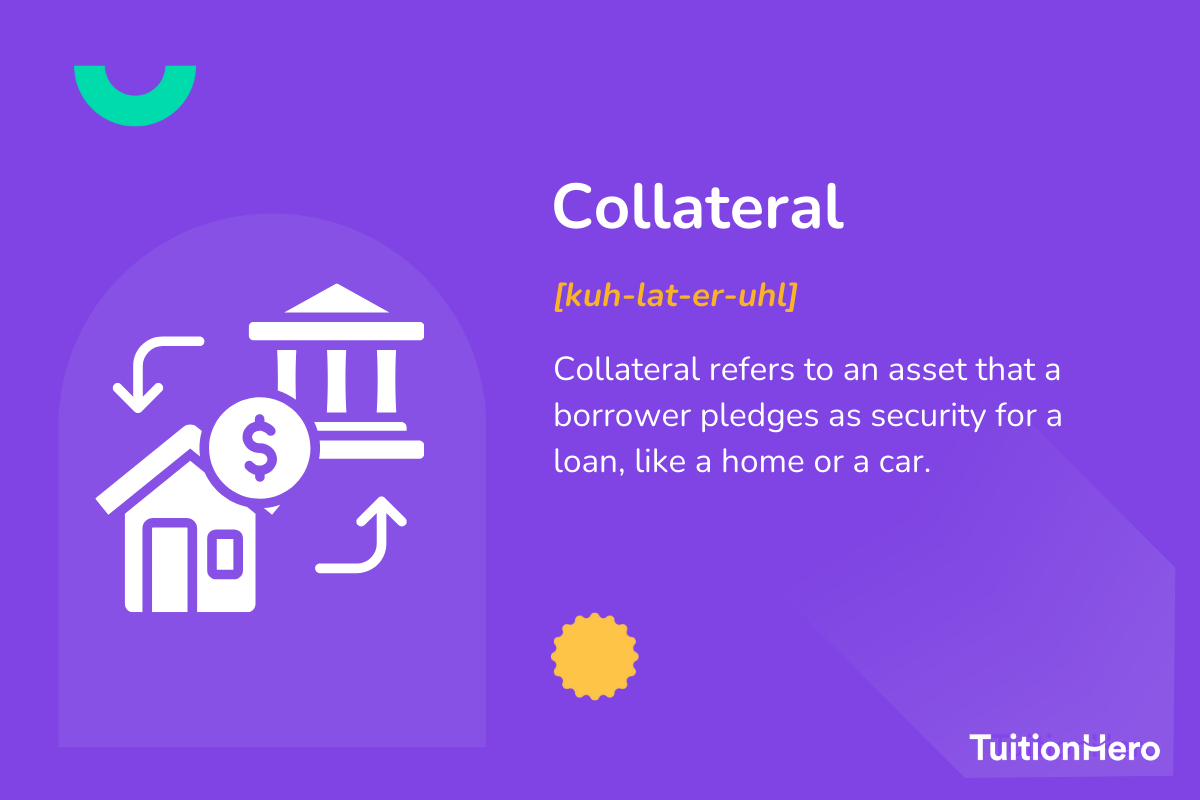Advertiser Disclosure
Last update: November 17, 2024
4 minutes read
What is Collateral?
Do you know what constitutes collateral for a loan? Learn about collateral with our simplified guide. Explore the definition, types, and real-world examples for a clearer understanding of loans and finance.

By Brian Flaherty, B.A. Economics
Edited by Rachel Lauren, B.A. in Business and Political Economy
Learn more about our editorial standards



By Brian Flaherty, B.A. Economics
Edited by Rachel Lauren, B.A. in Business and Political Economy
Learn more about our editorial standards
Ever had that sinking feeling in your gut when you're about to make a big financial move? You've probably heard terms like interest rates, principal amounts, and... collateral? What's the deal with collateral, and what does it have to do with your federal or private student loans?

Key takeaways
- Collateral is a valuable asset pledged to secure a loan
- Secured loans often come with lower interest rates and larger amounts
- Missing payments on secured loans risks the seizure of the asset
What is collateral?
What is collateral? Collateral is a valuable asset that you, the borrower, pledge as a security net for a loan.
Think of it like this: It's the thing you’re willing to give up if you can’t pay back the loan, ensuring the lender that if things go south, they have something solid to fall back on.
It's pretty much the backbone of many financial agreements. A loan that has collateral backing it up is called a secured loan because the lender has security.

How does collateral work?
Before a lender hands over a wad of cash, they wanna be sure of one thing: Will you pay it back? That's where collateral comes in.
It's a concrete assurance for lenders, almost like having a backup plan. If you're paying on time, you’re good. But if you trip up, they have the right to grab that asset you put down as collateral.
And yes, they can sell it to recover their money. It's a solid choice for lenders to minimize their risk.
What are the real-world examples of collateral?
- Residential mortgages: If you take a loan to buy a home, your house is often the collateral. If you default, the lender can repossess your house.
- Home equity loans: Your home isn’t just for Netflix. It can also serve as collateral for a second loan, letting you draw against its equity. Why would anyone do this? Perhaps to start a business, or pay off other debt. But remember, there's a limit to how much you can borrow.
- Margin trading: For people who are into the stock market, this one's a game-changer. It lets investors borrow money, using their account balance as collateral, to buy more shares. But beware, it's a double-edged sword. Returns can be sky-high, but so can losses.
- Cars: Used for auto loans. Miss your payments, and you might be taking the bus. If you’re short on cash, you can also get a personal loan that’s secured against your car.
- Savings: Some folks use their savings or CDs to back personal loans.
And it's not just about big stuff. Smaller assets like jewelry (think pawn shops), or even future paychecks, can sometimes be used as collateral.

TuitionHero Tip
Always remember, it's a risky game. You're putting something valuable on the line.
What happens to your collateral if you can’t pay?
So, you've got the gist of what collateral is and how it plays out in the financial world. But what about the other side of the coin? What happens when, for some unexpected reason, you just can't keep up with those payments?
When you default on your loan, the drama unfolds. The lender, depending on your agreement, might consider your loan in default after missing a payment for 30 to 90 days. However, there's often a grace period.
You're not immediately labeled a "defaulter"; lenders understand that life happens, so your collateral doesn’t get taken away immediately. But, if things don't pick up, you're in for a wild ride.
- Repossession: For assets like cars, this can be quick. One day you're cruising in your ride, and the next, it's gone.
- Foreclosure: A more drawn-out process, typically. If you've defaulted on your mortgage, the foreclosure process usually kicks off 3 to 6 months after your first missed payment. And, depending on where you live, lenders might have to take you to court first. So, there's a chance to negotiate or make amends.
Compare private student loans now
TuitionHero simplifies your student loan decision, with multiple top loans side-by-side.
Compare Rates
Dos and don'ts of secured loans
Before you start your secured loan journey, it's a solid choice to know some do’s and don'ts. Let's get straight to it:
Do
Do read the fine print.
Do shop around for the best rates.
Do ask questions if in doubt.
Do have a repayment plan in place.
Don't
Don't rush into decisions.
Don't skip understanding the terms.
Don't overlook the value of collateral.
Don't miss out on seeking expert advice.
Advantages and disadvantages of using collateral-based (secured) loans
Diving into secured loans can get complicated. There are twists, turns, and plenty of decisions to make. To help you out, let's break down the pros and cons of opting for secured loans.
- Better interest rates: Lenders often give lower interest rates for secured loans compared to unsecured ones, given that they offer less risk to the lender.
- Higher loan amounts: Got valuable collateral? You might just bag a larger loan.
- Credit score boost: Regular repayments can amp up your credit score.
- Access for those with poor credit: No stellar credit history? No problem. Putting up collateral might help you qualify.
- Risk of losing assets: Defaulting can mean saying goodbye to your collateral.
- Potential debt spiral: If not managed well, one loan might lead to another. Slippery slope, right?
- Might get a lower value: Lenders may undervalue your collateral, giving you less than it's worth.
- Restrictions and red tape: Some secured loans come with their share of conditions and paperwork. Yeah right, as if we needed more paperwork!

Why trust TuitionHero
Finance, particularly collateral, can be confusing. TuitionHero simplifies this for students and parents. We help with Private Student Loans, Student Loan improvements, and Scholarship searches. Trust us to guide you to smart financial decisions.
Frequently asked questions (FAQ)
Man assets can serve as financial collateral, including real estate, vehicles, savings accounts, stocks, and valuable personal belongings. The type of collateral accepted may depend on the lender and the nature of the loan.
Financial collateral can positively affect loan approval and interest rates. Lenders may be more willing to approve a loan secured by collateral as it reduces their risk. Plus, secured loans often come with lower interest rates compared to unsecured loans.
Yes, the value of the collateral can influence the loan amount approved. Lenders may assess the value of the collateral to determine the maximum loan amount they are willing to offer. Higher-value collateral may result in a higher approved loan amount.
Final thoughts
Understanding collateral is like having a flashlight in the dark corners of investments. TuitionHero's services are designed to shine a light on college finances, providing clarity and relief. Since education is an investment, we're here to help you get the best returns on it. Ready to explore? Dive into what we offer, and let us guide you as your financial hero!
Sources
Author

Brian Flaherty
Brian is a graduate of the University of Virginia where he earned a B.A. in Economics. After graduation, Brian spent four years working at a wealth management firm advising high-net-worth investors and institutions. During his time there, he passed the rigorous Series 65 exam and rose to a high-level strategy position.
Editor

Rachel Lauren
Rachel Lauren is the co-founder and COO of Debbie, a tech startup that offers an app to help people pay off their credit card debt for good through rewards and behavioral psychology. She was previously a venture capital investor at BDMI, as well as an equity research analyst at Credit Suisse.
At TuitionHero, we're not just passionate about our work - we take immense pride in it. Our dedicated team of writers diligently follows strict editorial standards, ensuring that every piece of content we publish is accurate, current, and highly valuable. We don't just strive for quality; we aim for excellence.
Related posts
While you're at it, here are some other college finance-related blog posts you might be interested in.
Shop and compare student financing options - 100% free!

Always free, always fast
TuitionHero is 100% free to use. Here, you can instantly view and compare multiple top lenders side-by-side.

Won’t affect credit score
Don’t worry – checking your rates with TuitionHero never impacts your credit score!

Safe and secure
We take your information's security seriously. We apply industry best practices to ensure your data is safe.
Finished scrolling? Start saving & find your private student loan rate today





